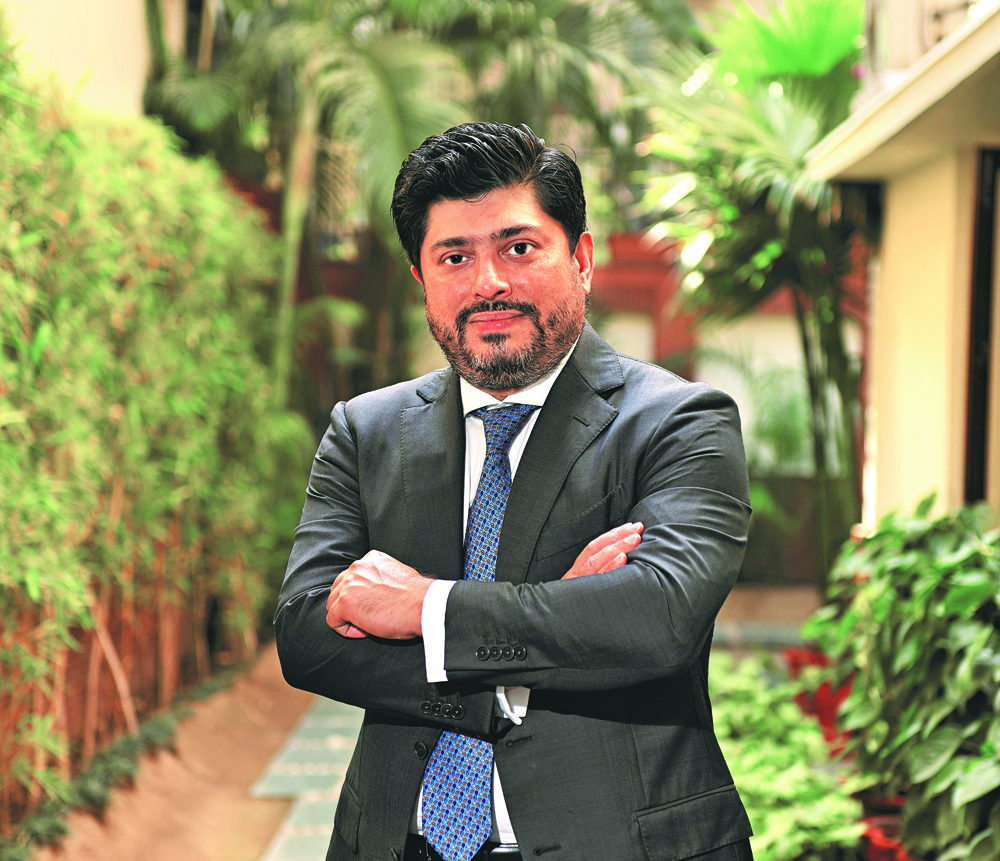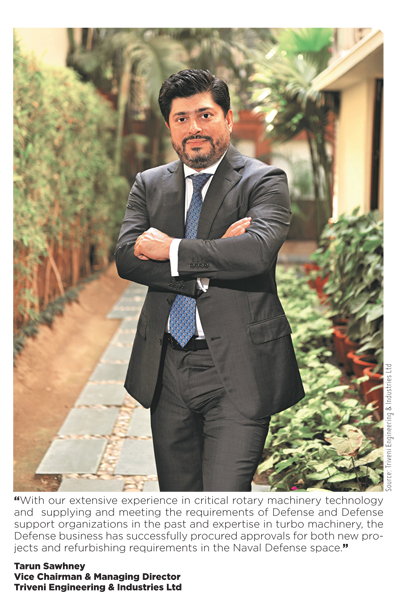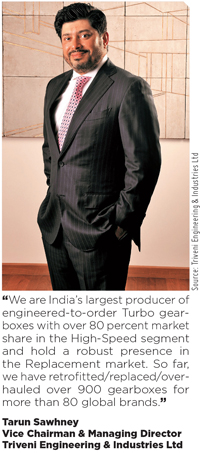On a High Growth Path

Tarun Sawhney, Vice Chairman & Managing Director, Triveni Engineering & Industries Ltd (TEIL), in this free-wheeling interview with MMI’s Editor- in-Chief, Soumi Mitra, offers us a peek into the company’s current happenings and shares the challenges faced and tided over during the pandemic lockdowns, the impact of the Government’s Atmanirbhar initiatives on its portfolio, and the benefits derived out of automation.
Triveni Engineering & Industries Ltd (TEIL) is around a 90-year-old diversified business conglomerate and one of the leaders in Engineering businesses. Kindly help our readers learn more about it.
Tarun Sawhney: TEIL is a diversified, integrated, and sustainable organization rooted in innovation, quality, and customer-centricity. We are a market leader in our engineering businesses. We are an industry-leading organization, with extensive expertise in delivering quality products and solutions to a growing clientele across geographies. The foundation of our profitable growth and sustained value delivery is built on our network of strong relationships, research & development capabilities, excellence in manufacturing, engineering efficiency, and stringent quality controls. We run our operations with strict adherence to all Environment, Health & Safety (EHS) norms to provide clean, safe, and healthy working conditions for our employees as well as total protection to the communities around which we operate.
We have six co-generation plants, and the company currently operates 104.5 MW grid-connected capacity. Subsequently, in the engineering business, we have the Power Transmission Business (PTB) focused on delivering innovative, value-engineered, and reliable products and solutions in the areas of Gears, Defense, and Built-to-Print.
 We have seven world-class FSSC 22000 certified sugar manufacturing facilities with over 61,000 tonne per day crushing capacity. In the last few years, the company has also stepped up its production of ethanol in line with the Government of India’s National Policy on Biofuels, and today, we have 320 KLPD manufacturing capacity which is already under expansion to 660 KLPD.
We have seven world-class FSSC 22000 certified sugar manufacturing facilities with over 61,000 tonne per day crushing capacity. In the last few years, the company has also stepped up its production of ethanol in line with the Government of India’s National Policy on Biofuels, and today, we have 320 KLPD manufacturing capacity which is already under expansion to 660 KLPD.
In our Water business, we are the leading solutions provider for efficient water management for industrial, municipal/urban applications. Our focus is on delivering customized and sustainable futuristic solutions aimed at addressing the growing shortage of water resources. Our water technology protects resources and encourages recycling and reuse of water in large cities and industries.
With your legacy, how do you ensure being state-of-the-art and remaining profitable?
It was a remarkable achievement for our business group to stay profitable by bringing transformation as per the ever-changing business environment. Firstly, we increased productivity through economies of scale and increased sugar recoveries, and then by diversifying and increasing our focus in the other business segments. We made investments in the right areas to enable sustained growth and become more competitive at the domestic and international levels. Our total debt has been significantly reduced, and it is now approximately 50 percent lower than it was five years ago. As a result of the overall macro environment and the company’s initiatives in its various business segments, we believe we are well poised to grow from here on.
Like all business establishments, TEIL must have been impacted by the challenges posed by the COVID-19 pandemic. How did you address them to register strong growth? What were your learnings from the pandemic?
For the company as a whole, we at TEIL responded with unparalleled agility and successfully steered our business through unprecedented challenges to deliver outstanding performance for FY 21. Our response to COVID-19 was both cautious and aggressive. We took several targeted initiatives to protect the health and safety of our employees, supply chain partners, communities, and other stakeholders while ensuring business continuity in a complex environment.
Automation and digitalization became synonymous with the new way of functioning, with our IT teams working relentlessly to steer an organization-wide business transformation amid the new normal. We adopted new technologies with extraordinary speed and moved fast to embrace the Internet of Things (IoT) and Industry 4.0 practices, particularly in our Power Transmission and Water businesses, to enhance productivity while complying with the various restrictions imposed across the country amid the pandemic crisis.
Our Engineering businesses, which faced a total shutdown of operations during the lockdown period, returned to normalcy by mid-May 2020. Amid the unprecedented COVID pandemic, the Power Transmission Business completed over 1,000 international deliveries in FY21. In the Water business, we secured an international EPC order of Water and Sewerage projects worth US$22.80 million (`156 crore, net of GST) from the Ministry of National Planning, Housing and Infrastructure, Republic of Maldives, funded by Exim Bank of India.
 The business portfolio of TEIL includes Integrated Sugar, Alcohol, Co-Generation Power, Water Solutions, Power Transmission, and Defense. How have the Government’s Atmanirbhar initiatives been helping businesses of your stature?
The business portfolio of TEIL includes Integrated Sugar, Alcohol, Co-Generation Power, Water Solutions, Power Transmission, and Defense. How have the Government’s Atmanirbhar initiatives been helping businesses of your stature?
The Government has been encouraging businesses to become independent and self-reliant in all senses. Through its National Biofuel Policy, the Government has expanded the scope of raw materials for ethanol production by allowing sugarcane juice, sugar-containing materials like sugar beet, sweet sorghum, etc., that are unfit for human consumption for ethanol production. Today, ethanol blending in India has reached close to 8 percent. The goal of 20 percent ethanol blending by 2025 will accelerate the growth of the Ethanol industry in the country, which will aid in reducing the country’s dependence on imported crude.
We, at Triveni, have been leveraging the capacities, capabilities, and efficiencies of our distilleries effectively to make the most of the Ethanol opportunity unleashed by the Government of India’s National Policy on Biofuels. Today, we are at 400 crore liter of demand, which should go up to 1,000 crore liter when we touch 20 percent blending. We are doubling our existing distillery plant capacities with a low Capex, and with this, our total plant capacity will reach 660 KLPD by 2022-23.
Our Power Transmission Business (PTB) segment caters to customers across 70 countries via a state-of-the-art manufacturing facility in India. The Gears business has bagged multiple gearboxes orders for various domestic customers for their expansion requirement through various OEMs for all high-speed applications.
We are also actively engaged with the naval headquarters, shipyards, and other naval establishments to participate in major upcoming projects with indigenous designs or with Transfer of Technology (ToT) collaborations for varying products.
The Government, in Atmanirbhar 3.0, announced investing of `10,200 crore for Capex in Defense-related industries. How has this move affected your Defense line of business?
Our Defense business is a strategic foray guided by the company’s ability to identify and harness emerging opportunities. The segment is poised to cater to engineered equipment requirements for Defense under the ‘Make in India’ Initiative. With our extensive experience in critical rotary machinery technology and in supplying and meeting the requirements of Defense and Defense support organizations in the past and expertise in turbo machinery, the Defense business has successfully procured approvals for both new projects and refurbishing requirements in the Naval Defense space.
Through its strong portfolio of current and upcoming products, the business is well poised to contribute to the indigenization of high-end technology in the Indian Defense Industry in line with the Government’s ‘Make in India’ policy. The ‘Make in India’ initiative has led to new opportunities for diverse engineered products, and Triveni’s Mysuru facility is actively participating in many of these indigenous development projects. The Defense Procurement Policy 2020 focuses on self-reliance for various equipment in Design, Development, and Manufacture by the Indian Industry. Most of the new projects envisaged by the Defense sector are customized requirements for critical equipment, offering substantial value to PTB’s rotating machinery portfolio. PTB initially focused on Naval Defense markets and has gained some foothold in the critical turbo pumps space.
TEIL adopted new technologies with extraordinary speed and moved fast to embrace the Internet of Things (IoT) and Industry 4.0 practices, particularly in its Power Transmission business.
What are your views on the ‘Make in India’ initiative in niche segments like Power Transmission?
Triveni is the key contributor to the Government’s ‘Make in India’ initiative and caters to customers across 70 countries via its manufacturing facilities in India. It is India’s largest producer of engineered-to-order Turbo gearboxes with over 80 percent market share in the High-Speed segment and holds a robust presence in the Replacement market. So far, we have retrofitted/replaced/overhauled over 900 gearboxes for more than 80 global brands. Very few companies provide customized gears manufacturing as it requires advanced technology and stringent adherence to international standards. Therefore, Triveni has a differentiated edge.
The Government’s ‘Aatmanirbhar Bharat Abhiyan’ scheme will cater to the sustenance of laborers, the middle class, the Cottage industry, Medium and Small Enterprises (MSMEs), and other industries. It is a step towards Self-Reliant India, which will support the ‘Make in India’ program while helping MSMEs boost their business. We are hopeful that the Gears business can significantly contribute to the indigenization of gearboxes to further align with the Aatmanirbhar program announced by the Government of India.
The adoption of new technologies and robotic systems is helping firms overcome the effects of the pandemic while keeping their workforce safe. How do you view automation, and what would you be suggesting to smaller players who still have apprehensions regarding implementing it?
Rapid technological progress poses challenges for labor markets. Automation both displaces and creates job markets. At present, an unprecedented digitalization of the economy is ongoing. Artificial intelligence has become a reality, and machines can learn how to outperform humans in some cognitive tasks.
Automation adoption is very likely to result in the growth of small players as these businesses often face challenges such as massive competition with large corporations, reduced budgets, less workforce, etc. As automation tools are incredibly diverse, they can help with multiple tasks in no time.
At Triveni, we have been among the pioneers in using automation and digitalization in our sugar operations. The usage of the Vehicle Tracking System for sugarcane transportation and satellite-based sugarcane area mapping has been implemented for a long time.
The goal of 20 percent ethanol blending by 2025 will accelerate the growth of the Ethanol industry in the country, which will aid in reducing the country’s dependence on imported crude.
How far have Indian players reached the deployment of Industry 4.0 and other advanced manufacturing technologies such as Artificial Intelligence and Machine Learning?
Industry 4.0 is gaining popularity due to the rapid improvements made in cyber-computing capabilities in the last few decades. It has started making inroads in the Indian Manufacturing, Real Estate, IT-ITes, and other sectors. While the development of automation in India has been comparatively lower than in the rest of the world, it is growing significantly.
“With our extensive experience in critical rotary machinery technology and supplying and meeting the requirements of Defense and Defense support organizations in the past and expertise in turbo machinery, the Defense business has successfully procured approvals for both new projects and refurbishing requirements in the Naval Defense space.”

SOUMI MITRA
Editor-in-Chief
Modern Manufacturing India
soumi.mitra@magicwandmedia.in
Source: Triveni Engineering & Industries Ltd



 Facebook
Facebook.png) Twitter
Twitter Linkedin
Linkedin Subscribe
Subscribe